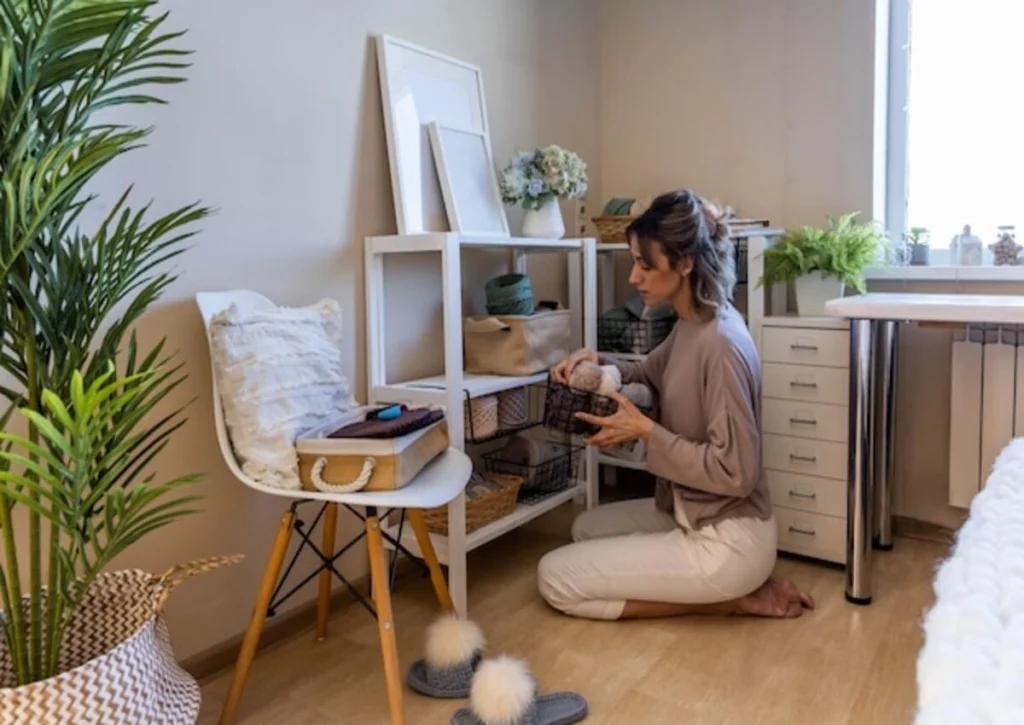Organization is not just about having a clean home; it’s about establishing a life that facilitates smarter spending. If your home is organized and things have a home, you waste less time hunting down misplaced things and spend fewer dollars replacing things you already have. Organization at home translates into organization in finances.
An organized home enables you to make use of what you have before acquiring something new. Well-organized, sorted food, from well-organized, sorted clothing, order will make you more conscious about your belongings and priorities. In the end, that consciousness translates into tangible cost savings, improved habits, and a clear conscience that no fleeting purchase can provide.
Why Clutter Costs You Money
Clutter isn’t just a visual problem; it’s a financial one. When drawers, closets, and garages are full of unorganized items, it becomes harder to know what you already have. This often leads to buying duplicates, forgetting about perishable goods, or losing valuable things altogether. Organized spaces save both time and money by making everything easy to find and use. Many families benefit from NSA Storage spaces built around you, where extra belongings can be safely stored without overcrowding the home. Having a clear system creates a sense of control, helping people make better financial and lifestyle decisions.
A clutter-free environment also lowers emotional stress, which often drives impulsive spending. When your surroundings feel calm, you’re less likely to shop for comfort or buy things you don’t truly need.
Myth vs reality: Many believe that decluttering requires expensive organizers or large renovations. In reality, thoughtful rearrangement and consistent maintenance are enough to create order and savings without major expense.
Saving Through Smart Storage
An effective storage plan can turn your home into a place of balance and financial awareness. Smart storage means using your space intentionally, grouping similar items, labeling containers, and keeping essentials within reach. When everything has its place, you spend less time searching and more time using what you already own.
Creating efficient systems also prevents food spoilage, lost supplies, and unnecessary purchases. Even small improvements, like clear bins in the pantry or hooks for daily items, reduce waste and frustration.
Smart storage isn’t about having more containers; it’s about building habits that support efficiency and simplicity. By designing spaces around real needs and routines, you naturally cut down on clutter and costs while enjoying a home that feels peaceful and purposeful every day.
Reducing Waste with Better Systems
A well-organized home naturally reduces waste, from groceries to household supplies. Many readers wonder how order can really affect their budget. The truth is that clutter hides what’s already available, leading to expired food, forgotten purchases, and wasted money. Here are some of the most common questions about reducing waste through organization.
How does home organization help save money?
When everything is stored properly and easy to see, you use what you have before buying more. Organized spaces prevent overstocking and reduce the need for last-minute shopping.
What’s the best way to start organizing for less waste?
Begin with small, high-traffic areas like the kitchen or bathroom. Group similar items together and use clear containers to track supplies. Labeling shelves or boxes makes it easier to stay consistent.
Can organizing actually improve sustainability?
Yes. Organization leads to more mindful consumption, fewer impulse buys, and less food or product waste. It also promotes smarter use of reusable items, reducing environmental impact.
A tidy home means fewer wasted resources and more intentional living, both for your budget and the planet.
Creating Habits That Pay Off
An organization works best when it becomes a habit. Simple, consistent actions can create systems that last and support both your financial and mental well-being.
Fast actionable tips:
- Schedule a 10-minute declutter session each day.
- Review your pantry weekly to avoid duplicate purchases.
- Donate or sell unused items every few months.
- Keep track of household supplies in one central list
- Reevaluate storage areas seasonally for efficiency.
Consistency turns order into a lifestyle that supports savings and satisfaction. Regular attention to your space keeps it functional and fresh.
Common mistakes to avoid: Many people try to organize everything at once, leading to burnout. Others buy unnecessary storage products before assessing their real needs. Start small and build sustainable habits.
Real Stories of Organized Savings
A couple of times, they discovered that despite their acceptable salaries, they always found themselves lacking money toward the final week of the month. After monitoring their spending, they discovered that the better part of their budget went missing in unused subscriptions, spontaneous buys, and duplicates, products they previously purchased that they could no longer locate in the house. They then reorganized the areas they live in, beginning with the pantry, closets, and home office.
After decluttering and sorting, their level of awareness increased. They started planning meals on the basis of ingredients already on hand, stopped remaking lost items, and terminated unwanted services. In three months, the money saved noticeably increased, and everyday tension was brought down. They discovered that control over money was not merely a budget issue, but began with the environment.
This is one experience that reveals that spaces, when organized, have hidden spending habits. Knowing what you have, you will end up making more purposeful spending decisions.
Benefits versus risks: Benefits are reduced waste, diminished stress, and increased control over spending. It creates lasting habits that make decision-making easy. Risks show up when the organizing is too perfection-driven or too extensive, generating frustration or guilt rather than relief. Balancing prevents the system from working, rather than working, for you.
This is the one story that illustrates that order is contemporary consciousness. How you work on your house directly correlates with how you work on money, time, and comfort.
Living Well by Living Neat
An organized home brings more than a clean space; it builds a sense of security and calm that encourages smarter living. By creating structure, you reduce unnecessary expenses and gain freedom to focus on what truly adds value to your life.
How an organized home helps you save more than you think reminds us that small steps toward order can lead to big, lasting financial rewards.



